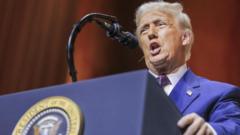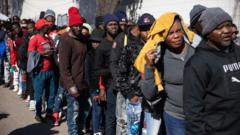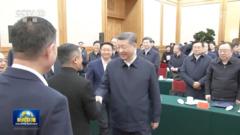Germans will vote this Sunday to elect their next chancellor in a highly contentious atmosphere, as economic and social challenges fuel the electoral debates.
Germans Prepare for Critical Election Amidst Economic and Immigration Tensions

Germans Prepare for Critical Election Amidst Economic and Immigration Tensions
As German voters get ready for a pivotal election, key issues such as economic stagnation and immigration loom large.
Germany is gearing up for a significant election on Sunday, with Friedrich Merz, a conservative ex-businessman from the Christian Democrats, tipped to lead the race. His main competitor, the far-right Alternative for Germany (AfD), is currently polling second and is mired in controversies related to neo-Nazi affiliations and alleged anti-state plots. Political analysts suggest that Merz may resonate better with U.S. President Donald Trump than the incumbent, Olaf Scholz of the Social Democratic Party, particularly given the evolving security landscape in Europe.
Key issues driving voter sentiment include economic performance and immigration. The German economy faces stagnant growth and waning competitive edge, particularly in traditional sectors like auto manufacturing, prompting discontent among the populace. Many voters appear disinclined to support Scholz's continuation in office due to these concerns.
On the immigration front, Germany’s welcoming stance toward millions of refugees in recent years remains contentious. While many refugees have integrated well, a rise in crime linked to immigrant communities has stoked native fears and dissatisfaction, further complicating the electoral landscape.
The dynamics of U.S. foreign policy under Trump also color the electoral atmosphere. While general animosity towards Trump persists among Germans, recent developments may shift voter priorities. Trump's recent exclusion of Europe, including Germany, from negotiations regarding the Ukrainian conflict could catalyze public sentiment against him and indirectly influence the election.
As voting day approaches, the interplay of these issues will likely shape the future political trajectory of Germany.
Key issues driving voter sentiment include economic performance and immigration. The German economy faces stagnant growth and waning competitive edge, particularly in traditional sectors like auto manufacturing, prompting discontent among the populace. Many voters appear disinclined to support Scholz's continuation in office due to these concerns.
On the immigration front, Germany’s welcoming stance toward millions of refugees in recent years remains contentious. While many refugees have integrated well, a rise in crime linked to immigrant communities has stoked native fears and dissatisfaction, further complicating the electoral landscape.
The dynamics of U.S. foreign policy under Trump also color the electoral atmosphere. While general animosity towards Trump persists among Germans, recent developments may shift voter priorities. Trump's recent exclusion of Europe, including Germany, from negotiations regarding the Ukrainian conflict could catalyze public sentiment against him and indirectly influence the election.
As voting day approaches, the interplay of these issues will likely shape the future political trajectory of Germany.




















